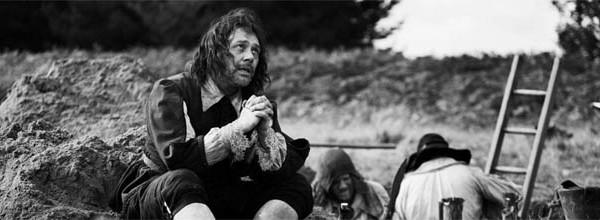By far the most experimental of his films, Wheatley’s latest venture is a brain-spinning tour de force that at times more closely resembles a collection of vivid tableaux than a coherent story. At once hypnotic and nerve-shredding, and featuring a stand out central performance from Reece Shearsmith, A Field in England is a gobsmackingly original piece of cinema that dares to invite the audience into its strange world without ever truly offering up its secrets.
At the height of the English Civil war, academic and divination dabbler Whitehead (Shearsmith) is sent into the fray to carry out a task set him by his master. When he fails, the desperate Whitehead flees the conflict and encounters three other deserters (Ryan Pope, Peter Ferdinando and Richard Glover), quickly becoming coerced into accompanying them to a nearby alehouse. On the way, seemingly friendly leader of the pack Cutler (Pope) reveals his sinister intentions and before long Whitehead is at the mercy of some hallucinogenic mushrooms and a man by the name of O’Neill (Michael Smiley).
 To say much more than that would give the game away because, although A Field in England is by no means a film driven by plot, it is one built upon a series of slowly unfolding surprises.
To say much more than that would give the game away because, although A Field in England is by no means a film driven by plot, it is one built upon a series of slowly unfolding surprises.
As established by the excellent Kill List, Wheatley is a master of the uncanny, and his latest film often feels like an exploration of all the ways we can be unsettled as an audience.
A Field in England largely disturbs because it confounds the senses: jaunty folk songs jangle over a bass note of lingering dread; characters talk and stare into the camera and – in one vivid hallucination sequence – the simple use of a split screen mirror effect contorts the familiar into the nightmarish.
Consistently, Wheatley sets the horrifying against the everyday and, as with his previous films, comedy is a key part of the tone. But where laughter might bring relief in another, less pervasively unsettling film, here it only adds to the sickening feeling that terrible things are coming for everyone.
Perhaps most disturbing of all is the way in which so much is left unanswered. We have no anchor here, nothing tying us to a particular location or timeframe. It’s hard to say whether any of these people are even real; could this whole thing simply be a hallucination on the part of the traumatised Whitehead?
At the centre of this strange fable is an astonishing performance from Shearsmith, whose background in grotesque, theatrical comedy equips him perfectly for the role. Though he is the civilizing influence in the group, Whitehead is pushed to embrace the darkness within.
There is one particularly skin-crawling moment when Whitehead finds himself at the mercy of Smiley’s terrifically villainous O’Neill. The camera slowly follows Whitehead as he moves, under the other man’s spell, soundtracked with a swelling electronic score (a far cry from the rhythmic period music which has gone before) that turns this horrifying sequence into a moment of strange beauty. It’s a testament to Wheatley’s clarity of vision that all these elements come together so smoothly, and with such a disquieting effect.
Ultimately, A Field in England is Wheatley’s attempt to scrabble at the darkest corners of the human mind and convert what he finds there to the screen. Whether or not you find yourself frustrated by the open-ended nature of the film, what is undeniable is that Wheatley has made something which truly disturbs and challenges his audience. And, in this day and age, that is a rare gift.
![]()
Released in cinemas, on DVD, on demand and on Film4 on Friday 5 July 2013.
> Buy A Field In England on DVD on Amazon.
What did you think of A Field in England? Let us know below…

